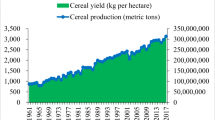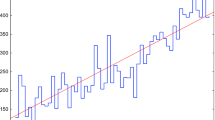Abstract
We used an autoregressive distributed lag (ARDL) modeling to investigate the short- and long-term effects of climate change on Tunisian cereal farming. The Pooled Mean Group (PMG) estimation as well as Granger causality tests conducted on a regional panel of the country, covering a time horizon from 1975 to 2014, showed that climate change issues still persist in Tunisia, affecting negatively and increasingly the cereal output. This study proves that negative effects of climate are rather felt when there is a shortage of rainfall, whereas the current temperature levels are still in favor of cereal crop. The findings indicate that cereal farming requires a continuous technology pack deployment and a favorable climate. However, an unanticipated long-run relationship has been observed between cereal production and labor. As a result of this research, recommendations were built around two major strategies, namely yield improvement and farmers’ income stabilization to mitigate the unpredictable effects of climate change and hazardous events. The implementation of a production and regional specialization map and the adoption of an anti-drought insurance system in addition to compensation payment would be a suitable adaptation policy to climate change effects and for the sustainability of Tunisian agriculture.


Similar content being viewed by others
References
Ahmed A, Devadason ES, Al-Amin AQ (2016) Implications of climate change damage for agriculture: sectoral evidence from Pakistan. Environ Sci Pollut Res 23(20):20688–20699
Arshad M, Kächele H, Krupnik TJ, Amjath-Babu TS, Aravindakshan S, Abbas A, Mehmood Y, Müller K (2016) Climate variability, farmland value, and farmers’ perceptions of climate change: implications for adaptation in rural Pakistan. Int J Sust Dev World Ecol 23(5):1–13
Attiaoui I, Toumi H, Ammouri B, Gargouri I (2017) Causality links among renewable energy consumption, CO2 emissions, and economic growth in Africa: evidence from a panel ARDL-PMG approach. Environ Sci Pollut Res 24(14):13036–13048
Barnett J (2003) Security and climate change. Glob Environ Chang 13(1):7–17
Bildirici M (2013) Relationship between biomass energy and economic growth in transition countries: panel ARDL approach. GCB Bioenergy 6:717–726. https://doi.org/10.1111/gcbb.12092
Chalise S, Naranpanawa A (2016) Climate change adaptation in agriculture: a computable general equilibrium analysis of land-use change in Nepal. Land Use Policy 59(31):241–250
Dell M, Jones BF, Olken BA (2012) Temperature shocks and economic growth: evidence from the last half century. Am Econ J Macroecon 4:66–95
Deschenes O, Greenstone M (2007) The economic impacts of climate change: evidence from agricultural output and random fluctuations in weather. Am Econ Rev 97:354–385
Doll P (2009) Vulnerability to the impact of climate change on renewable groundwater resources: a global-scale assessment. Environ Res Lett 4(3):1–12
Engle RF, Granger CW (1987) Co-integration and error correction: representation, estimation, and testing. Econometrica (55)2:251–276. https://doi.org/10.2307/1913236
Gutierrez L (2003) On the power of panel cointegration tests: a Monte Carlo comparison. Econ Lett 80(1):105–111
Im K, Pesaran M, Shin Y (2003) Testing for unit roots in heterogeneous panels. J Econ 115:53–74
Jacob B, Lefgren L, Moretti E (2007) The dynamics of criminal behavior evidence from weather shocks. J Hum Resour 42(3):489–527
Janjua PZ, Samad G, Khan N (2014) Climate change and wheat production in Pakistan: an autoregressive distributed lag approach. NJAS-Wageningen J Life Sci 68:13–19
Jayatilleke SB, Yiyong C (2014) The impact of climate change on food crop productivity, food prices and food security in South Asia. Econ Anal Policy 44:451–465
Kao C (1999) Spurious regression and residual-based tests for cointegration in panel data. J Econ 90:1–44
Karlsson S, Löthgren M (2000) On the power and interpretation of panel unit root tests. Econ Lett 66(3):249–255
Kersebaum KC, Nendel C (2014) Site-specific impacts of climate change on wheat production across regions of Germany using different CO2 response functions. Eur J Agron 52:22–32
Lehmann N, Finger R, Klein T, Calanca P, Walter A (2013) Adapting crop management practices to climate change: modeling optimal solutions at the field scale. Agric Syst 117:55–65
Levin A, Lin C, Chu C (2002) Unit root tests in panel data: asymptotic and finite sample properties. J Econ 108:1–24
McLeman R, Smit B (2006) Migration as an adaptation to climate change. Clim Chang 76(2):31–53
Mendelsohn R, Nordhaus WD, Shaw D (1994) The impact of global warming on agriculture : a Ricardian analysis. Am Econ Rev 753–771
Miguel E, Satyanath S, Sergenti E (2004) Economic shocks and civil conflict: an instrumental variables approach. J Polit Econ 112(4):725–753
Pedroni P (2004) Panel cointegration: asymptotic and finite sample properties of pooled time series tests with an application to the PPP hypothesis. Economet Theor 20(3):597–625
Pesaran MH, Smith RP (1995) Estimating long-run relationships from dynamic heterogeneous panels. J Econ 94:79–113
Pesaran MH, Shin Y, Smith RJ (1996) Testing for the existence of a long-run relationship. Faculty of Economics, University of Cambridge
Pesaran MH, Shin Y, Smith RP (1999) Pooled mean group estimation of dynamic heterogeneous panels. J Am Stat Assoc 94:621–634
Pesaran MH, Shin Y, Smith RJ (2001) Bounds testing approaches to the analysis of level relationships. J Appl Econ 16(3):289–326
Reinsborough MJ (2003) A Ricardian model of climate change in Canada. Can J Econ 36(1):21–40
Richter GM, Semenov MA (2005) Modelling impacts of climate change on wheat yields in England and Wales: assessing drought risks. Agric Syst 84(1):77–97
Savo V, Salvati L, Caneva G (2016) In-between soil erosion and sustainable land management: climate aridity and vegetation in a traditional agro-forest system (Costiera Amalfitana, southern Italy). Int J Sust Dev World Ecol 23(5):1–10
Sultana H, Ali N, Iqbal MM, Khan AM (2009) Vulnerability and adaptability of wheat production in different climatic zones of Pakistan under climate change scenarios. Clim Chang 94(1–2):123–142
Tanveer M, Anjum SA, Hussain S, Cerdà A, Ashraf U (2017) Relay cropping as a sustainable approach: problems and opportunities for sustainable crop production. Environ Sci Pollut Res 24(8):6973–6988
Traore B, Corbeels M, Van Wijk MT, Rufino MC, Giller KE (2013) Effects of climate variability and climate change on crop production in southern Mali. Eur J Agron 49:115–125
Tripathi A, Tripathi DK, Chauhan DK, Kumar N, Singh GS (2016) Paradigms of climate change impacts on some major food sources of the world: a review on current knowledge and future prospects. Agric Ecosyst Environ 216:356–373
Zaied YB, Zouabi O (2016) Impacts of climate change on Tunisian olive oil output. Clim Chang 139(3–4):535–549
Zouabi O, Kadria M (2016) The direct and indirect effect of climate change on citrus production in Tunisia: a macro and micro spatial analysis. Clim Chang 139(2):307–324
Zouabi O, Peridy N (2015) Direct and indirect effects of climate on agriculture: an application of a spatial panel data analysis to Tunisia. Clim Chang 133(2):301–303
Author information
Authors and Affiliations
Corresponding author
Additional information
Responsible editor: Muhammad Shahbaz
Publisher’s note
Springer Nature remains neutral with regard to jurisdictional claims in published maps and institutional affiliations.
Rights and permissions
About this article
Cite this article
Attiaoui, I., Boufateh, T. Impacts of climate change on cereal farming in Tunisia: a panel ARDL–PMG approach. Environ Sci Pollut Res 26, 13334–13345 (2019). https://doi.org/10.1007/s11356-019-04867-y
Received:
Accepted:
Published:
Issue Date:
DOI: https://doi.org/10.1007/s11356-019-04867-y




